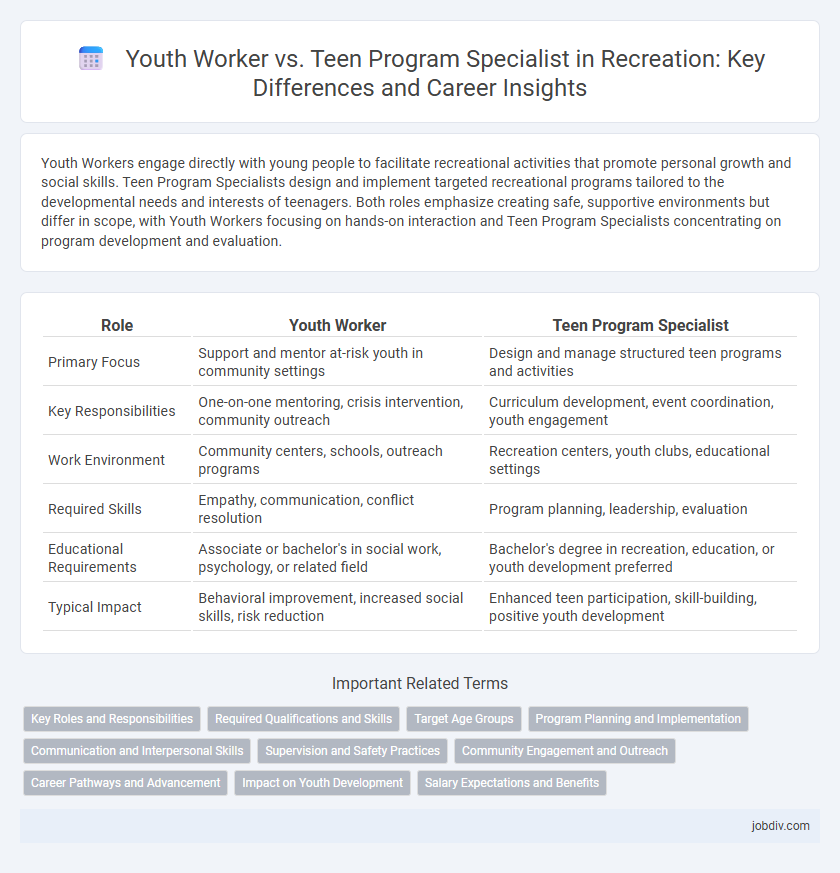Youth Workers engage directly with young people to facilitate recreational activities that promote personal growth and social skills. Teen Program Specialists design and implement targeted recreational programs tailored to the developmental needs and interests of teenagers. Both roles emphasize creating safe, supportive environments but differ in scope, with Youth Workers focusing on hands-on interaction and Teen Program Specialists concentrating on program development and evaluation.
Table of Comparison
| Role | Youth Worker | Teen Program Specialist |
|---|---|---|
| Primary Focus | Support and mentor at-risk youth in community settings | Design and manage structured teen programs and activities |
| Key Responsibilities | One-on-one mentoring, crisis intervention, community outreach | Curriculum development, event coordination, youth engagement |
| Work Environment | Community centers, schools, outreach programs | Recreation centers, youth clubs, educational settings |
| Required Skills | Empathy, communication, conflict resolution | Program planning, leadership, evaluation |
| Educational Requirements | Associate or bachelor's in social work, psychology, or related field | Bachelor's degree in recreation, education, or youth development preferred |
| Typical Impact | Behavioral improvement, increased social skills, risk reduction | Enhanced teen participation, skill-building, positive youth development |
Key Roles and Responsibilities
Youth Workers engage directly with young people, facilitating recreational activities and providing mentorship to support personal development and social skills. Teen Program Specialists design, implement, and evaluate structured programs tailored to teenagers, focusing on educational and recreational goals to promote positive youth development. Both roles require strong communication skills and a deep understanding of adolescent needs, but Teen Program Specialists often handle administrative tasks and program management in addition to hands-on youth interaction.
Required Qualifications and Skills
Youth Workers typically require a high school diploma or equivalent, with some positions favoring experience in counseling or social services; essential skills include communication, empathy, and conflict resolution. Teen Program Specialists often need a bachelor's degree in recreation, education, or social work, alongside expertise in program development, youth leadership, and behavioral assessment. Both roles demand strong organizational abilities and a deep understanding of adolescent development to effectively engage and support young populations.
Target Age Groups
Youth Workers primarily engage with children and young adolescents aged 8 to 15, focusing on foundational developmental activities and social skills. Teen Program Specialists concentrate on older teens, typically 15 to 19 years old, designing programs that address advanced leadership, career readiness, and personal growth. Both roles tailor recreational and educational content to meet the unique developmental needs of their specific age groups.
Program Planning and Implementation
Youth Workers focus on direct engagement with young individuals, implementing activities that promote social development and emotional well-being within community settings. Teen Program Specialists design and oversee structured programs aimed at adolescents, ensuring alignment with educational goals and youth development standards through strategic planning and resource coordination. Effective program planning and implementation in both roles require understanding youth needs, measuring program outcomes, and adapting activities to foster positive growth and participation.
Communication and Interpersonal Skills
Youth Workers demonstrate strong communication skills by effectively engaging with diverse adolescents and fostering trust through active listening and empathy. Teen Program Specialists excel in interpersonal skills by designing targeted activities that promote teamwork and conflict resolution among teens. Both roles require the ability to adapt communication styles to meet the developmental and emotional needs of youth in recreation settings.
Supervision and Safety Practices
Youth Workers ensure safety by actively supervising diverse recreational activities, implementing age-appropriate safety protocols, and maintaining secure environments for children and teens. Teen Program Specialists focus on developing targeted program curricula that incorporate risk management strategies while training staff to recognize and mitigate potential hazards. Both roles prioritize compliance with regulatory safety standards and foster open communication to promptly address safety concerns within youth-focused recreational settings.
Community Engagement and Outreach
Youth Workers and Teen Program Specialists both play critical roles in community engagement and outreach, with Youth Workers focusing on direct interaction, mentorship, and support for young individuals in diverse recreational settings. Teen Program Specialists design, implement, and evaluate structured programs aimed at promoting youth development, emphasizing targeted outreach to increase participation and foster community connections. Both roles require strong communication skills, cultural competency, and a deep understanding of youth needs to effectively engage teens and support positive outcomes.
Career Pathways and Advancement
Youth Workers often begin their careers by gaining hands-on experience in community centers or social service agencies, which provides foundational skills in youth engagement and support. Teen Program Specialists typically advance by obtaining specialized certifications and pursuing higher education in recreation or adolescent development, enabling them to design and lead targeted programs for teens. Career pathways in recreation emphasize growth through progressively responsible roles, with opportunities for leadership positions such as program coordinators or director roles in youth-focused organizations.
Impact on Youth Development
Youth Workers provide direct mentorship and support, fostering emotional resilience and social skills in young people through hands-on activities and personalized guidance. Teen Program Specialists design and implement targeted programs that address developmental needs, promoting leadership, academic achievement, and community engagement. Both roles significantly contribute to youth development by creating supportive environments that encourage growth, self-confidence, and positive behavior change.
Salary Expectations and Benefits
Youth workers typically earn between $30,000 and $45,000 annually, with benefits including health insurance, paid time off, and retirement plans. Teen program specialists may expect higher salaries ranging from $40,000 to $55,000, reflecting their specialized skills in adolescent development and program coordination. Both roles often receive professional development opportunities and flexible work schedules to support work-life balance.
Youth Worker vs Teen Program Specialist Infographic

 jobdiv.com
jobdiv.com